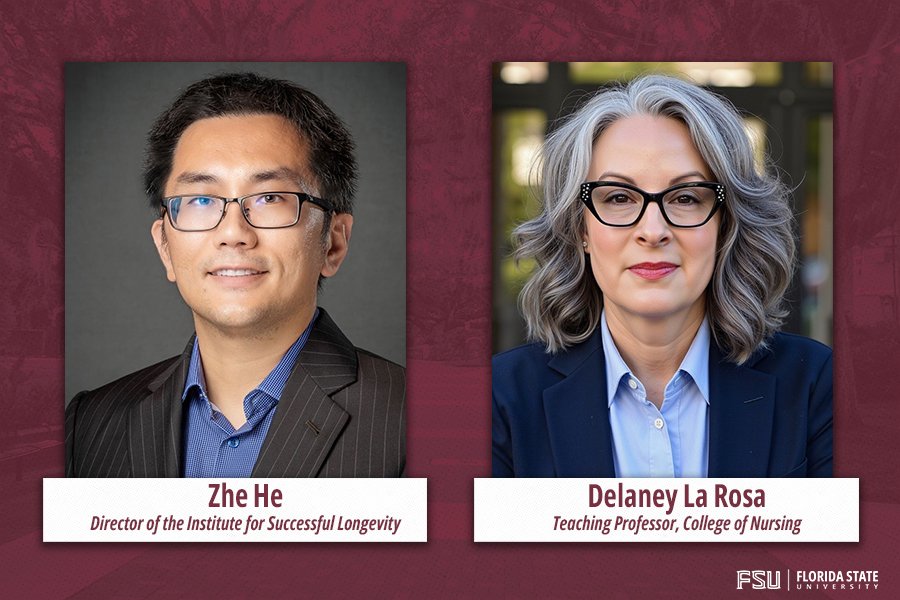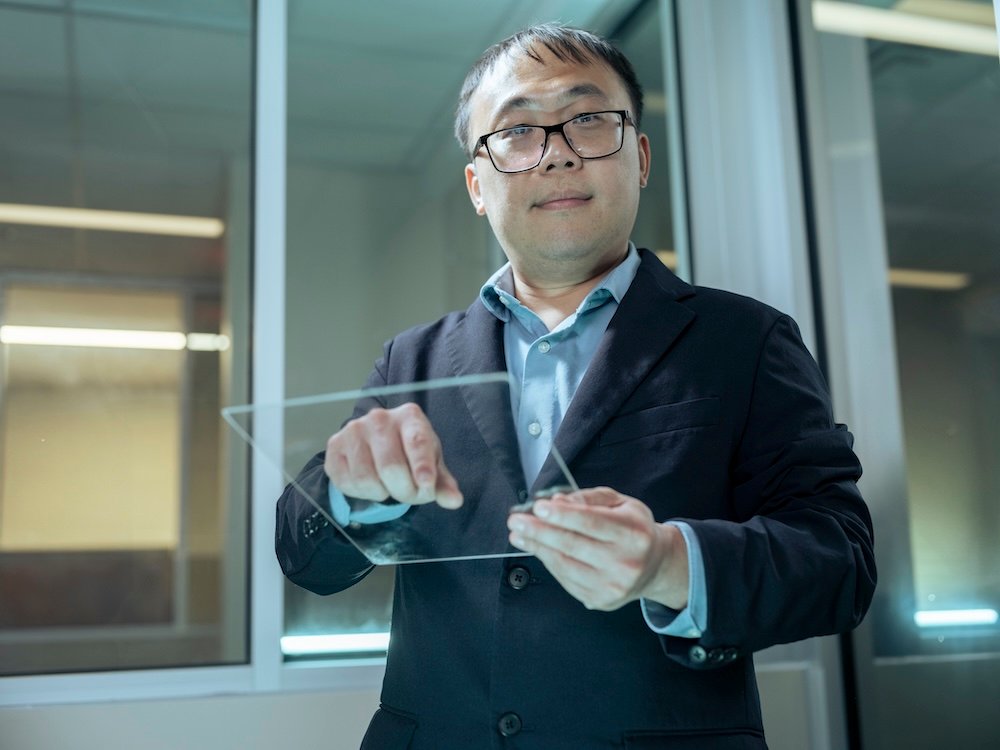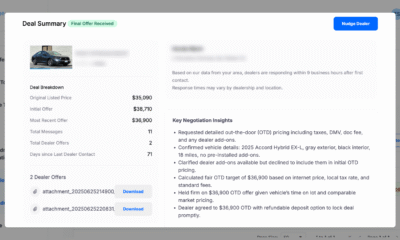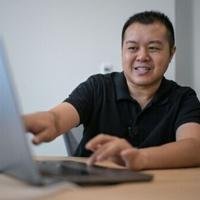AI Insights
‘A burgeoning epidemic’: Why some kids are forming extreme emotional relationships with AI

As more kids turn to artificial intelligence to answer questions or help them understand their homework, some appear to be forming too close a relationship with services such as ChatGPT.
As more kids turn to artificial intelligence to answer questions or help them understand their homework, some appear to be forming too close a relationship with services such as ChatGPT — and that is taking a toll on their mental health.
“AI psychosis,” while not an official clinical diagnosis, is a term clinicians are using to describe children who appear to be forming emotional bonds with AI, according to Dr. Ashley Maxie-Moreman, clinical psychologist at Children’s National Hospital in D.C.
Maxie-Moreman said symptoms can include delusions of grandeur, paranoia, fantastical relationships with AI, and even detachment from reality.
“Especially teens and young adults are engaging with generative AI for excessive periods of time, and forming these sort of fantastical relationships with AI,” she said.
In addition to forming close bonds with AI, those struggling with paranoia may see their condition worsen, with AI potentially affirming paranoid beliefs.
“I think that’s more on the extreme end,” Maxie-Moreman said.
More commonly, she said, young people are turning to generative AI for emotional support. They are sharing information about their emotional well-being, such as feeling depressed, anxious, socially isolated or having suicidal thoughts. The responses they receive from AI vary.
“And I think on the more concerning end, generative AI, at times, has either encouraged youth to move forward with plans or has not connected them to the appropriate resources or flagged any crisis support,” Maxie-Moreman said.
“It almost feels like this is a burgeoning epidemic,” she added. “Just in the past couple of weeks, I’ve observed cases of this.”
Maxie-Moreman said kids who are already struggling with anxiety, depression, social isolation or academic stress are most at risk of developing these bonds with AI. That’s why, she said, if you suspect your child is suffering from those conditions, you should seek help.
“I think it’s really, really important to get your child connected to appropriate mental health services,” she said.
With AI psychosis, parents need to be on the lookout for symptoms. One could be a lack of desire to go to school.
“They’re coming up with a lot of excuses, like, ‘I’m feeling sick,’ or ‘I feel nauseous,’ and maybe you’re finding that the child is endorsing a lot of physical symptoms that are sometimes unfounded in relation to attending school,” Maxie-Moreman said.
Another sign is a child who appears to be isolating themselves and losing interest in things they used to look forward to, such as playing sports or hanging out with friends.
“I don’t want to be alarmist, but I do think it’s important for parents to be looking out for these things and to just have direct conversations with their kiddos,” she said.
Talking to a child about mental health concerns can be tricky, especially if they are teens who, as Maxie-Moreman noted, can be irritable and a bit moody. But having a conversation with them is key.
“I think not skirting around the bush is probably the most helpful thing. And I think teens tend to get a little bit annoyed with indirectness anyhow, so being direct is probably the best approach,” she said.
To help prevent these issues, Maxie-Moreman suggested parents start doing emotional check-ins with their children from a young age.
“Just making it sort of a norm in your household to have conversations about how your child is doing emotionally, checking in with them on a regular basis, is important. So starting at a young age is what I would recommend on the preventative end,” she said.
She also encouraged parents to talk to their children about the limits of the technology they use, including generative AI.
“I think that’s probably one of the biggest interventions that will be most helpful,” she said.
Maxie-Moreman said tech companies must also be held accountable.
“Ultimately, we have to hold our tech companies accountable, and they need to be implementing better safeguards, as opposed to just worrying about the commercialization of their products,” she said.
Get breaking news and daily headlines delivered to your email inbox by signing up here.
© 2025 WTOP. All Rights Reserved. This website is not intended for users located within the European Economic Area.
AI Insights
FSU experts available to discuss the role of artificial intelligence in health care

On Sept. 3, the United States House Committee on Energy and Commerce Subcommittee on Health held a hearing on the critical issue of advancing American health care through artificial intelligence.
Championed by many organizations, including the American Medical Association, the use of AI in health care is seen as one of the new technology’s most important benefits. It is utilized in ways that improve patient health outcomes, provide surgical precision, enhance diagnostic accuracy and much more.
Florida State University’s Zhe He, a professor in the College of Communication and Information and director of the Institute for Successful Longevity, recently developed a study highlighting AI’s impact in diagnostic accuracy, personalized treatment plans, interpreting medical images, streamlining operations and supporting remote patient monitoring among many successful initiatives.
His research lies in the intersection of biomedical and health informatics, artificial intelligence, and big data analytics. He is an elected fellow of the International Academy of Health Sciences Informatics (IAHSI) and the American Medical Informatics Association (AMIA).
“AI has already reshaped health care in tangible ways,” He said of the new technology’s transformative impact. “We now use AI to analyze electronic health records, medical images, and even predict differential diagnosis, mortality and hospital readmissions. These tools don’t replace clinicians, but they extend their reach and help reduce diagnostic delays, personalize treatments and improve efficiency. Importantly, AI is also opening doors to rural communities by enabling new models of remote monitoring and telehealth support.”
Delaney La Rosa, teaching professor at the College of Nursing, is an educator and academic leader whose work bridges clinical practice, digital innovation, and equity-centered curriculum design. She is a nationally recognized researcher and speaker on the ethical application of AI in nursing and education.
La Rosa has expertise in health care informatics, the use of AI in health care and the integration of AI in health care education. She explores how emerging technologies can be aligned with human-centered, accessible approaches to teaching and care.
“The area that AI is transforming health care most is in the preemptive area,” La Rosa said. “We’re finding out when a patient is about to decline or when a patient is about to go septic. We are looking through data across populations.”
“In rural primary care clinics, we know that these areas are stretched for staffing,” she added. “What these AI tools can do is they can use the data across that primary office’s entire population of patients and, using the training that it was trained with, can identify patients who are most likely to develop conditions or who are most likely to benefit from preventive programs.”
Media interested in learning about the multitude of ways AI is advancing health care can reach out to Zhe He at zhe@fsu.edu and Delaney La Rosa at dwl25b@fsu.edu.
Zhe He, professor in the College of Communication and Information and director of the Institute for Successful Longevity
1. We’ve seen enormous impacts already, but what other areas in health care do you feel AI can potentially change in the future?
I see three big frontiers:
Patient engagement: Tools that help people better understand their lab results, medications and care plans can empower them to make more informed choices.
Aging and chronic disease management: With our aging population, AI can play a vital role in predicting risks, supporting caregivers and promoting adherence to treatment.
Clinical research and drug discovery: AI is accelerating trial recruitment, optimizing study design and uncovering new therapeutic targets. Over the next decade, I think these areas will be transformed just as radiology has been over the past decade.
2. How has AI impacted the work you do?
My research focuses on making health information more accessible and actionable with informatics and AI. For example, my team is developing LabGenie, a GenAI-powered system that helps older adults and caregivers interpret lab test results and generate personalized questions for their clinicians. We are also developing AI-based systems to promote adherence to cognitive training, support post-transplant care and identify strategies for HIV prevention and management for young adults. Across all of this work, AI is not an end in itself—it’s a means to improve patient engagement, adherence to treatment and shared decision making.
Delaney La Rosa, teaching professor, College of Nursing
1. What kinds of advancements has the College of Nursing made as it invests heavily in AI?
From my personal perspective, the biggest contribution we are making for AI is two-fold: The first is we lead the nation. We are the first with a degree in health care AI for our students. There is a big juggernaut out there — we must quickly learn how to use AI and then we must quickly teach our students how to use AI and use it ethically, which is another big issue, and then graduate workforce-ready individuals. Not only do we have our degree program, but we are about to release a microcredential where we develop six total courses for a certificate program called Nursing Essentials of Responsible AI. We are also beginning our postgraduate certificate. We’re leading the nation in graduating. We’re getting workforce-ready students.
The second thing is we are leading an AI consortium and having our first launch summit that’s happening in Orlando on Sept. 17 – the Nursing and AI Innovation Consortium Launch Summit. And what that means is that we have leaders from across industries — research, practice, higher education — who are coming together, and we’re going to sit at the table and determine where we want to go next in AI.
2. How critical is the role you play in terms of AI education?
I think the most important thing to me is our foundational essentials course. This course gives you a good grounding in the things that are not going to really change much in AI. It’s that base understanding so we can know the language. One thing that nurses are great at is being able to assess the data and information that’s coming out to see if it’s quality and it’s scientific. But you can’t do that in AI unless you have a basic understanding of how it works.
AI Insights
Kennesaw State researcher aiming to bring artificial intelligence to everyday devices

KENNESAW, Ga. |
Sep 10, 2025
Artificial intelligence (AI) is often linked to supercomputers and massive data centers,
but Kennesaw State University researcher Bobin Deng is aiming for something a bit
more accessible through a new National Science Foundation (NSF) grant.
An assistant professor in Kennesaw State’s College of Computing and Software Engineering, Deng said the goal is to move AI beyond the cloud and into the hands of people where it can have the most impact – their personal devices. The research could allow AI tools to function without an internet connection, something that is uncommon with many current systems.
“Most of today’s AI runs on large, expensive servers,” Deng said. “But many applications don’t need that level of computing power. “If we can run AI directly on a mobile phone, a drone, or other smaller systems, then we remove the reliance on costly supercomputers and make AI easier and faster access in more situations.”
At the heart of his project is a technique that uses activation sparsity, a process
where only a portion of neurons in an AI model are active while most remain inactive.
Instead of loading all the data into memory, the system accurately predicts in advance
which pieces it may need and loads only those, reducing memory usage, speeding up
processes, and lowering energy demands.
“Other methods shrink models by reducing the precision of data or pruning less important parameters,” Deng said. “Our approach is different. We predict which values will be activated. That allows us to combine our method with existing techniques like pruning or quantization to make models even more efficient.”
The project will test tiny machine– learning models as predictors to support larger systems. This balance makes AI more
feasible for devices like smartphones, drones, and industrial sensors.
The open-source simulator Deng’s team is building will allow other researchers and students to explore and refine the technology.
“This grant supports fundamental research that can benefit students in our new Master of Science in Artificial Intelligence program, as well as industry partners,” he said. “From monitoring factory robots to predicting equipment failures, embedding AI in smaller devices has the potential to transform many industries.”
Deng conducts his research in the Sustainable Smart System Lab on KSU’s Marietta Campus. He discussed how the university has played a vital role in supporting his work, from lab space to grant administration.
“The leadership here has been very supportive,” he said. “Whenever I have needed resources or assistance, from graduate assistants to proposal submissions, the university has been there to help.”
CCSE Interim Dean Yiming Ji commended Deng’s efforts as a reflection of the college’s mission to advance innovation and prepare students for the future of technology.
“Dr. Deng’s research represents the kind of forward-looking work that positions KSU as a leader in AI,” Ji said. “His approach not only addresses technical challenges but also creates real–world opportunities for students, industry partners, and the community.”
– Story by Raynard Churchwell
Photos by Darnell Wilburn
Related Stories
A leader in innovative teaching and learning, Kennesaw State University offers undergraduate, graduate, and doctoral degrees to its more than 47,000 students. Kennesaw State is a member of the University System of Georgia with 11 academic colleges. The university’s vibrant campus culture, diverse population, strong global ties, and entrepreneurial spirit draw students from throughout the country and the world. Kennesaw State is a Carnegie-designated doctoral research institution (R2), placing it among an elite group of only 8 percent of U.S. colleges and universities with an R1 or R2 status. For more information, visit kennesaw.edu.
AI Insights
YARBROUGH: A semi-intelligent look at artificial intelligence

Dr. Geoffrey Hinton is a British-Canadian cognitive psychologist and computer scientist who won the Nobel Prize in Physics last year “for foundational discoveries and inventions that enable machine learning with artificial neural networks.” Between you and me, I got hosed. I should have been a winner.
The Nobel committee obviously overlooked my own entry entitled, “One molecule of glucose bound to one molecule of fructose will make sugar and winning the Nobel Prize sure would be sweet.” I don’t think they know a lot about physics over there in Norway.
Just as I am known as a modest yet much-beloved columnist who bears an uncanny resemblance to a young Brad Pitt, Dr. Hinton who looks nothing like Brad Pitt, young or old, is considered the Godfather of Artificial Intelligence. That’s like being Godfather of the Mafia. Only worse.
If somebody in the Mafia got out of hand, you would just shoot them or put them in a tub of concrete and deposit them in the East River. According to Dr. Hinton, artificial intelligence is likely to get rid of anybody left in the Mafia and the rest of us as well and it won’t need a gun or a sack of concrete to do it.
“It’s not inconceivable,” he has stated, “that artificial intelligence could wipe out humanity,” saying that there was a “10 to 20 percent chance” that AI would be the cause of human extinction within the following three decades. In fact, many experts expect AI to advance, probably in the next 20 years, to be “smarter than people.”
Admittedly, I am not the go-to person on the subjects of cognitive psychology and computer science (although knowing how sugar is made is pretty impressive), but I would posit that it is not going to take 20 years for artificial intelligence to get smarter than people. That’s already occurred in some instances. Just look at Congress.
Can you see a computer saying, “Beep! Beep! Hey, I want to suck up to Donald Trump. I think I will propose changing the name of Greenland to Red, White and Blueland and then he will get me elected to the Senate where I can do other dumb stuff. Boop!” There are some things a computer won’t do, even if a member of Congress will.
Dr. Hinton also worries about the impact of AI on religion. He says, “I think religion will be in trouble if we create other beings. Once we start creating beings that can think for themselves and do things for themselves, maybe even have bodies if they’re robots, we may start realizing we’re less special than we thought. And the idea that we’re very special and we were made in the image of God, that idea may go out the window.” An interesting observation.
Theologically speaking, if computers become robots, will there be girl robots and boy robots? If so, will boy robots let girl robots in the pulpit? Or will the boy robots tell other robots that if they think girl robots should be allowed to preach, they will be condemned to spend eternity in an electronic waste disposal bin at Best Buys?
As to whether or not we are made in the image of God, I believe that’s God’s call, not mine. Creation is His thing. I will say that had God asked me, there are a few people He created that I think we could just as soon done without. I couldn’t find His image in them with a flashlight. Maybe He just put them here to show us He has a sense of humor.
I probably won’t be around to see how all this plays out but despite the Godfather of AI’s ominous warning, no robot will ever make me feel less special. I’ve got a family that loves me more than I deserve. I have friends that have stood with me through the good times and the bad. I had a rewarding career. I am blessed to live in this special state in this special country.
Most of all, thanks to a benevolent editor willing overlook misplaced commas and grammatical errors (Is it who or whom?), I have the opportunity to share my thoughts with you each week and to receive your feedback. That may come in the form of a kudo or a rap on the knuckles. I suspect robots won’t give a flying algorithm for you or your opinions. I do. And there is nothing artificial about that.
You can reach Dick Yarbrough at dick@dickyarbrough.com or at P.O. Box 725373, Atlanta, Georgia 31139.
-

 Business2 weeks ago
Business2 weeks agoThe Guardian view on Trump and the Fed: independence is no substitute for accountability | Editorial
-
Tools & Platforms4 weeks ago
Building Trust in Military AI Starts with Opening the Black Box – War on the Rocks
-

 Ethics & Policy1 month ago
Ethics & Policy1 month agoSDAIA Supports Saudi Arabia’s Leadership in Shaping Global AI Ethics, Policy, and Research – وكالة الأنباء السعودية
-

 Events & Conferences4 months ago
Events & Conferences4 months agoJourney to 1000 models: Scaling Instagram’s recommendation system
-

 Jobs & Careers2 months ago
Jobs & Careers2 months agoMumbai-based Perplexity Alternative Has 60k+ Users Without Funding
-

 Podcasts & Talks2 months ago
Podcasts & Talks2 months agoHappy 4th of July! 🎆 Made with Veo 3 in Gemini
-

 Education2 months ago
Education2 months agoMacron says UK and France have duty to tackle illegal migration ‘with humanity, solidarity and firmness’ – UK politics live | Politics
-

 Education2 months ago
Education2 months agoVEX Robotics launches AI-powered classroom robotics system
-

 Funding & Business2 months ago
Funding & Business2 months agoKayak and Expedia race to build AI travel agents that turn social posts into itineraries
-

 Podcasts & Talks2 months ago
Podcasts & Talks2 months agoOpenAI 🤝 @teamganassi



















